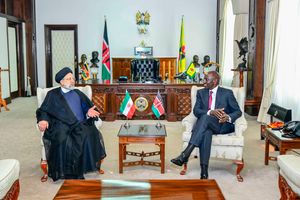Now you see it, now you don’t

Andrew Simiyu, an illusionist, during the interview at Nation Centre on October 7, 2016. PHOTO | JEFF ANGOTE
What you need to know:
- An illusionist is a person who performs mind tricks, often through the use of cards and other more complicated props.
- Andrew told his boss about this new skill he was learning and the progress he was making, but his boss kept brushing him off. One day, the main performer at the circus failed to turn up, and desperate, his boss asked him to fill in. Andrew did a 45-minute performance that was so good, he got a standing ovation from the audience.
You have probably come across renowned illusionists such as American Criss Angel, who pulls tricks that leave many astonished.
Well, you might not exactly describe Andrew Simiyu as Kenya’s version of Criss Angel, but he is a pretty impressive illusionist. Simply put, an illusionist is a person who performs mind tricks, often through the use of cards and other more complicated props.
Andrew’s childhood was a difficult one. By 12, he was already working, trying to supplement the little that his parents, labourers, made.
“My mum was a house help, my dad a labourer who mostly worked at construction sites. The money they made was barely enough to feed and take care of me and my two sisters. Observing how much my parents were struggling to pay my school fees, I decided to drop out of school and join an acrobatic group based at Kawangware slums, where we lived – I was in Class Six.
He adds,
“A couple of Americans happened to be visiting during one of our performances at a hall in Kawangware. While interacting with us after the performance, one of them removed a pack of cards and demonstrated some card tricks that left me quite amazed, I wished I could learn more.”
However, he did not know of any institution that taught what he had just seen, nor did he know anyone who could do what the American had done. He forgot about it until he and his fellow acrobats were invited for a one-year tour of Spain.
“We would perform three times a day for five days a week. It was hard work, and it took such a toll on me, I ended up breaking one of my leg’s during a performance.”
Fortunately, the group was on a work permit, and so Andrew was entitled to pay throughout his stay in the country. It was during this off-stage period that he started studying books on illusion. He did this alongside working as an animator in a circus at Tenerife Island, Spain.
“My job generally entailed keeping the children entertained before the start of the circus show in the evenings. The job was flexible enough for me to get time to study hundreds of books on the subject of illusion, as well as practice and perfect the skill,” he explains.
Andrew told his boss about this new skill he was learning and the progress he was making, but his boss kept brushing him off. One day, the main performer at the circus failed to turn up, and desperate, his boss asked him to fill in. Andrew did a 45-minute performance that was so good, he got a standing ovation from the audience.
“It is then that it hit me that I could actually do this for a living and make much more than I was making as an acrobat.”
That performance led to many more invitations to other venues in Spain. When his visit came to an end, he returned home, keen to try out his new-found skills on his fellow Kenyans.
How has the reception been at home?
It has been quite positive, bearing in mind that it is a new form of art. I have performed in a number of events so far, and even done a couple of TV interviews on Citizen, K24 and Ebru TV.
What challenges come with the job?
There is the misconception that what I do is cheat, when in fact illusion is a form of art. Also, since it is a new form of art here, it has been difficult getting performances in spaces such as theatres, which prefer showing musicals and plays.
much do you charge per performance?
I charge Sh30,000 and above. Charges depend on the kind of event it is, performance time, the size of the team that I come with on stage, and how sophisticated the tricks I perform are, such as making items and people disappear.
Would you consider teaching your craft to others?
Definitely. I learnt what I know the hard way, and would be willing to make it easier for anyone who is seriously interested in learning the art.
What does the future hold for you?
I would like to regularly hold events in theatres, to have people pay to see me in action. I live for the day that illusion will be appreciated as a form of entertainment just as comedy and acting are.
You like to see Andrew in action or book him to perform? Visit his Facebook page, The Kenya illusionist.




